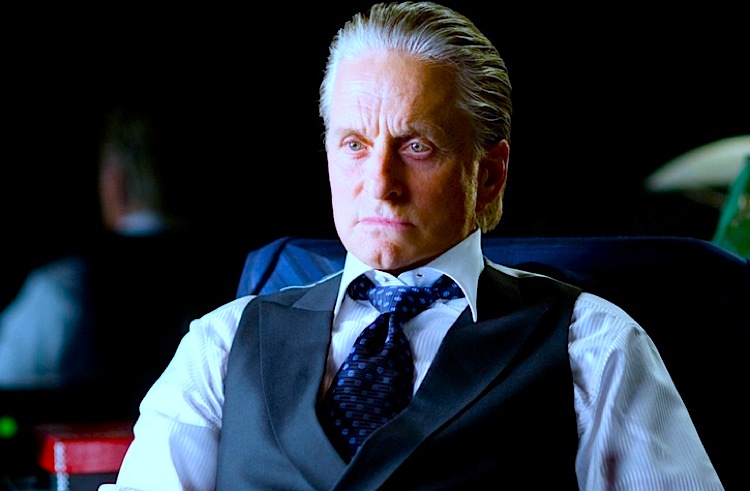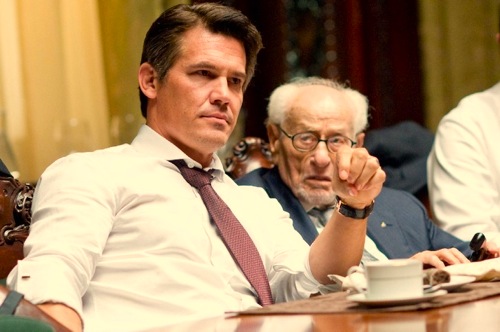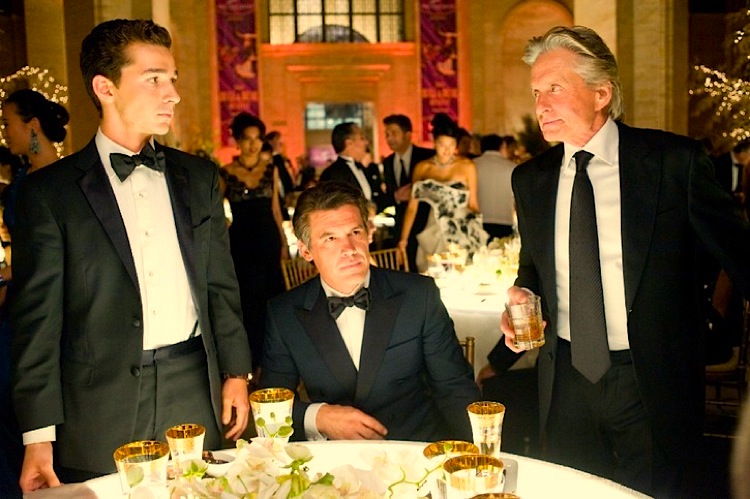By Jason Apuzzo. Let me begin by saying that this review is written for people who have not already been irretrievably burned by Oliver Stone. To those of you out there who have been irretrievably burned by Stone, you have my sympathies and my understanding – and if you feel sufficiently put off by Stone’s behavior over the years never to watch another one of his films, I will not argue the point. Stone is to blame for that, not you. So if you wish to proceed to another post here at Libertas, you have my blessings.
You would, however, be missing out on what is actually quite an enjoyable film in Wall Street 2 – a film that, much like the original Wall Street, is weirdly at odds with its creator in creating such a compelling and seductive portrait of a system the filmmaker supposedly despises. In this, Wall Street 2 becomes the latest example of a film that actually appears savvier and more insightful – not to mention warmer and more sentimental – than the man who made it.
I must confess that I was not expecting Stone’s film to be enjoyable, for at least three reasons. One, Stone’s skills as a filmmaker have atrophied significantly over the years. What originally put Oliver Stone on the map, culturally speaking, were well-constructed (if obnoxious) entertainments like Platoon and JFK. Stone’s Alexander, however, was easily one of the worst films I’ve seen over the past decade – a mess on so many levels that I can’t even imagine how the film ever got made, let alone released. And Stone’s World Trade Center seemed to miss its moment; if you think no one remembers 9/11 any more, absolutely nobody remembers Oliver Stone’s film about it. World Trade Center was an anodyne, strangely uninteresting exercise for such a voluble director as Stone – a lugubrious, by-the-numbers drama that could easily have been a made-for-TV movie, and that disgracefully avoided the subject of terrorism altogether. That Stone would avoid the subject of terrorism was not only dishonest and ideologically loaded on his part, but at odds with the drama of the moment – like making a movie about Pearl Harbor without mentioning Imperial Japan.
The third reason, of course, has to do with Stone’s compulsive politicizing of everything he does – and the Wall Street meltdown of 2008 seemed altogether too ripe an opportunity for someone with his blunderbuss sensibility – a kind of smorgasbord of possibilities to take potshots at the capitalistic system that has, of course, made his own career possible.

What I will confess to have forgotten, however, was what a seductive portrait of Wall Street Stone’s original Wall Street film was. Stories of the guys who were lured into lives as stock traders by Stone’s film – and by the magnetism of Michael Douglas’ Gordon Gekko character – are legendary, and form part of the strange and contradictory afterlife of that film as a high-end cult phenomenon. Wall Street did for The Street in the 80s what Top Gun did for the military. What Stone’s original film captured was the drama, the adrenaline rush, the heat and speed of the Wall Street lifestyle as it’s lived on a daily basis. Personal note here: I was close to two guys at Yale who were obsessed with Gekko (and American Psycho), and who got swept right into that world in the early 90s – and I mean all of that world, with its giddy, steroidal highs and humiliating lows. A world of glitzy New York penthouses, weekends in the Caribbean, coke, endless women, media scandal … and ego. Greed? Yes, there was that as well – but I never really bought the idea that what drives the guys on The Street is greed, per se. It always seemed more like ego, the desire to win – or at least, survive. More on that subject below.
And so the perverse truth of the matter is that Stone himself is as much to blame for today’s Wall Street as anybody else – which may be why he pops up occasionally in Wall Street 2, playing a cameo role an investor. [Which, incidentally, his own father was – his father having been a stock broker and a Republican who was broken by The Street and eventually went bankrupt.]
Wall Street 2: Money Never Sleeps brings this adrenaline-fueled world of Gordon Gekko back – with all its stratospheric highs and punishing lows – and updates it to the world of today, the world of the financial markets post-crash. And it attempts to incorporate what Stone has learned (if not necessarily what the rest of us have learned) from that calamity. Not surprisingly, what Stone has learned from the Meltdown is that greed was its driving force – not just the greed of the Wall Street guys (and they are depicted almost uniformly as guys in this film – there’s hardly a female in sight), but all of our greed. Greed here is defined as our current tendency to overreach, to live off little more than borrowed money and a prayer. For example: greed in the way we re-finance homes, based on … what? A desire to free up some cash without really doing anything. Or the way we leverage our other assets based on … what? Too often just a hope.

There’s truth in Stone’s critique, of course – not nearly the whole truth about what brought down the market, but certainly enough truth to serve as a kind of moralistic backdrop to Stone’s real business, which is actually not political at all. Wall Street 2 is really about about something else altogether, which is: how to maintain one’s integrity not only in the high-pressure environment of finance, but in the ultimate high-pressure environment of one’s own family. In essence, how do you preserve your own ego – when even people you love may be putting your well being in jeopardy?
Wall Street 2 is essentially a kind of 2-hour, five-Act Shakespearean family drama that begins with Gordon Gekko leaving jail in 2001, being given back his few remaining momentos from the 80s. [This is the great scene from the trailer, when he poignantly gets his empty gold money clip back – and his gigantic, 80s-era mobile phone.] Gekko leaves the jail, walks outside into the sunlight to find … no one waiting for him. He’s become the quintessential forgotten man. Flash forward to 2008, and the central character of the film: Shia LaBeouf’s ‘Jake Moore’ character. LaBeouf is a young guy on The Street, making his way up, who has two things that define him: he’s got smarts and is street-savvy (more so than Charlie Sheen from the original film), yet he also has an ‘idealistic’ side to him that’s kept fully charged by his web-activist girlfriend (Carey Mulligan), who just happens to be Gordon Gekko’s estranged daughter, Winnie. Winnie is extremely wary of her father, blaming him for the (off-screen) drug-related death of her brother. Gekko himself by this point in 2008 has now become a ‘reformed’ man, a best-selling book author whose media jeremiads are designed to warn others off of his earlier ‘bad’ example.
WARNING: SPOILERS AHEAD
Jake and the rest of Wall Street then undergo the 2008 meltdown, in which Jake’s financial house goes down – and Jake’s soft, humanistic mentor (Frank Langella) commits suicide. There’s something extremely dramatic about these early sequences of the film, because we get the sense of real history playing out – and Stone’s handling of these moments when the Feds are trying to decide who to bail out (or not) are handled nicely. One gets the sense of the arbitrariness, the messiness and – crucially – the egos involved in deciding who was to be saved, and who would walk the plank. We all like to feel that these were clean, impartial decisions – yet we know by now that they weren’t. [Why was Lehman allowed to go down, for example, but not AIG?] These decisions were as much a result of the personalities involved as the economics, or the politics for that matter.

Although Wall Street 2 is chock-full of politics – it’s an Oliver Stone film, so how could it not be? – Stone is to be commended for indulging in no Bush-bashing here, or elsewhere in this film. These tense early sequences play as I suspect they played out in real life – which is to say, on a knife-edge of suspense, as everybody – Republicans and Democrats – stared right into the abyss. Stone avoids political finger-pointing here, recognizing the gravity of the moment. In fact, the ‘reformed’ Gordon Gekko actually speaks up early in the film for the Bush Administration – admonishing people for rushing to blame Bush’s Administration for problems that were largely beyond their control. So if you’re expecting Wall Street 2 to roast Bush and Cheney over the coals – which Stone’s increasingly bizarre and erratic interviews seem to suggest – there’s none of it in the film. The bailout is presented as having essentially been the lesser of two evils: the ‘socialization’ of the market, in order to protect from 1929 Crash Redux (only worse). Continue reading LFM Review: Wall Street 2: Money Never Sleeps

